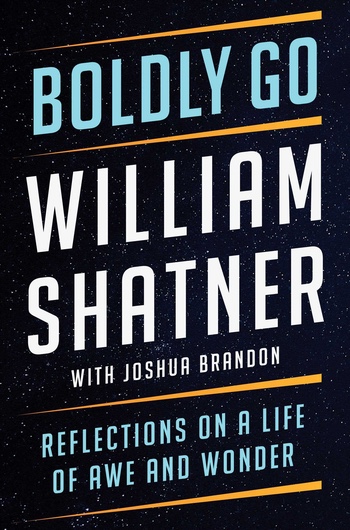Review: Boldly Goby Jeff Foust
|
| “And so, I thought, I must go to space. Not because I was Captain Kirk, but because I’m alive.” |
That experience resurfaced with the publication this month of Shatner’s new book, Boldly Go, the latest in a series of memoirs he’s written over the years. An excerpt of the book, published by Variety earlier this month, recounted aspects of that flight, including his recollections of the “cold, dark, black emptiness” of space: “all I saw was death.” That generated another wave of publicity about the flight, casting it in a negative light. “Welp, now I definitely don’t want to go to space,” wrote Emma Roth of The Verge, linking to the Variety excerpt. “[I]t sounds kind of terrifying.”
There is more to the story of the flight, though, told in Boldly Go. Shatner devotes a chapter of the book to his flight, titled “It’s Round. I Checked.” In the chapter, he credits the origins of his flight to Jason Ehrlich, who had produced a reality TV show that Shatner had appeared on. Ehrlich, he recalled, was lobbying Blue Origin to fly Shatner while simultaneously lobbying Shatner that he should fly on New Shepard. Shatner said he was skeptical they would be interested in flying an actor, but eventually accepted a meeting with Blue Origin founder Jeff Bezos at the company’s headquarters, where Shatner was impressed (that meeting is also featured in the documentary “Shatner in Space” last year.)
The prospect of flying in space languishes for a while because of flight delays—the initial meeting between Shatner and Bezos took place before the pandemic—but Shatner, buoyed by Ehrlich, thinks there’s a chance he could go on the first crewed flight. That doesn’t happen, but Ehrlich tells him a seat on the second might be possible. When that happens, he weighs the “wonder and thrill” of going to space against the risks, with the former winning out. “And so, I thought, I must go to space. Not because I was Captain Kirk, but because I’m alive.”
He skips ahead to the flight itself, where he makes clear that while the benefits of the flight outweigh the risks, those risks were at the forefront, as he worried about everything from the prospects of an explosion to being able to properly buckle into his seat for the five-g reentry. There is no shortage of melodrama for what turned out to be a routine flight. For example, when controllers tell the crew the countdown is briefly halted to check an engine anomaly, he is not reassured. “More importantly, why would they tell us that? There is a time for unvarnished honesty. I get that. This wasn’t it.” [Emphasis in original.]
| When controllers tell the crew the countdown is briefly halted to check an engine anomaly, he is not reassured. “More importantly, why would they tell us that? There is a time for unvarnished honesty. I get that. This wasn’t it.” |
When New Shepard launches, he says he’s less interested in experiencing weightlessness than looking out the window. He looks down at the Earth and then up into space, where that blackness surprised him. “Everything I had thought was wrong. Everything I has expected to see was wrong,” he said. “My trip to space was supposed to be a celebration; instead, it felt like a funeral.” (How different might his experience been had he flown at night, when the glare of the Sun would not have washed out the sky, revealing instead stars in sharper focus than in the best conditions on the ground?)
He later notes that he experienced the Overview Effect many other astronauts have reported, although perhaps more emotionally than most. “I wept for our planet,” he said he later told Bezos, fearing generations of environmental disasters to come. “Then Jeff let me in on his plan.” That plan, which Bezos has talked about publicly for years, is his long-term vision to move manufacturing and its environmental impact off Earth.
Shatner sounded receptive, but worried it would take too long. Nonetheless, he appeared to appreciate the flight, and is something of a fan of Bezos. “Jeff Bezos, I must say, is a misunderstood person,” he writes. “His excursion into outer space seems, on the surface, to be the excesses of capitalism shown off in a gaudy display of ego, and yet ego is not what has driven Jeff to space.”
And, for all his handwringing about the dangers of the flight, going to space on New Shepard was hardly the riskiest thing he did in the last few years: in the book’s introduction, he recalled scuba diving with sharks for a Shark Week episode. “To me, experiences must be felt. They must be lived. We need to reach out for love as well as fear if we want to stay vibrant.” Well, staying vibrant is the last thing Shatner has to worry about, whether it’s in the ocean or the edge of space.
Note: we are using a new commenting system, which may require you to create a new account.
